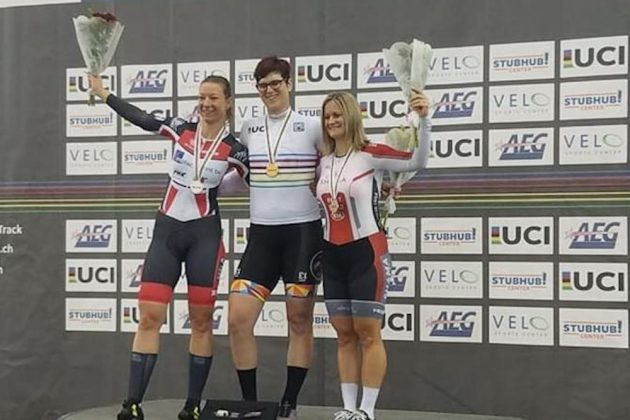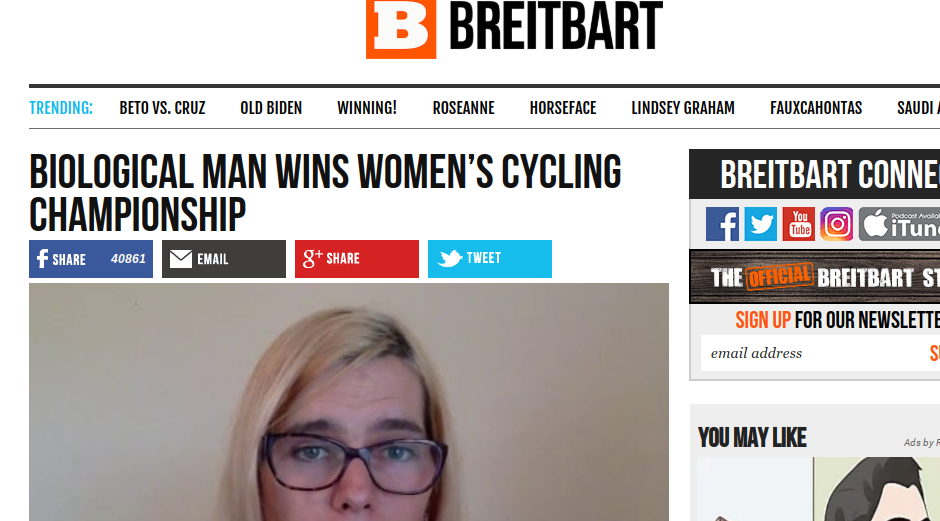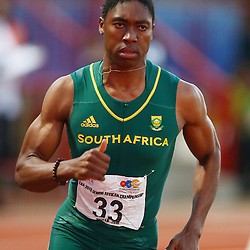What does it mean for sport to be fair?
 Rachel McKinnon, the first transgender world track cycling champion
Rachel McKinnon, the first transgender world track cycling champion
Dr. Rachel McKinnon, philosophy professor and trans athlete, has made the news recently with her historic world title in the women?s 35?44 sprint during the UCI Masters Track Cycling World Championships in Los Angeles.
Right-wing media was quick to pick this up and cried foul, saying it?s ?unfair? for trans women to compete against cis women because we are ?biologically male?. For example, this is how Breitbart ran the story:

The argument is simple:
- Trans women are biologically male
- Biological males have an unfair advantage in sports against biological females
- We should try to make sport fair
- The best way to make sport fair is to not let biological males ever compete against biological females
- Therefore, trans women should not compete against biological females.
I think (2) and (3) are true. All things being equal, males do have an advantage in sports with maybe the exception of long-distance swimming and ultra-endurance running. But everything else, males have the clear advantage.
You would think, therefore, that I am going to contest (1), which says trans women are biologically male.
But in fact I am going to grant the premise and go after (4) instead, the idea that ?males? should never, ever compete against ?females?. This doesn?t mean I think trans women are biologically male (the question is more philosophically complex than that) but I am going to grant the premise for the sake of the argument.
First, let?s define our terms.
Female: Anyone that under normal developmental conditions, produces large gametes (eggs)
Male: Anyone that under normal developmental conditions, produces small gametes (sperm)
Intersex: Anyone born with a mixture of male and female physiological features.
Under these definitions, trans women are male and cis women are female.
We already know this. It?s why international sporting bodies such as the Olympics require that trans women undergo at least two years of HRT: they are attempting to counter-balance the ?male features? of our physiology by getting the testosterone level to essentially zero.
Furthermore, it seems unreasonable to me that simply in virtue of being on HRT for two years all factors become equal in regards to athletic performance. That would be quite the turn of fate for everything to work out so perfectly balanced, wouldn?t it?
So, now, let?s assume for the sake of argument that after two years of HRT, trans women, on average, retain a small performance advantage compared to your average cis female.
Would (4) still be true in that ?The best way to make sport fair is to not let biological males ever compete against biological females??
I contend this is false. Why? Consider the case of Caster Semenya
Intersex Athletes and Why They Matter
 Caster Semenya
Caster Semenya
Caster Semenya doesn?t look like your average stereotype of a woman. She is tall, muscle-bound and athletic, with broad shoulders and a ?V-frame?. She is also a 2016 Olympic gold medalist in middle-distance running. But when since she first started winning world titles at women?s track events, she was subjected to scrutiny about her gender and was required to undergo ?gender tests? to verify she was indeed female.
It was discovered that Semenya has hyperandrogenism, which is naturally occurring excess levels of testosterone.
In April 2018, as a response to Semenya?s dominance on the field, the International Association of Athletic Federations announced new rules that requires hyperandrogenous athletes to take androgen blockers to lower their testosterone levels, effective beginning in November 2018.
So here we have a woman, assigned female at birth, raised as female all her life, being in an analogous situation with trans women insofar as she is seen as having a competitive advantage to due to her unique physiological features.
It is the lifelong history of testosterone exposure which gives trans women their slight physical advantage. But Caster Semenya also has a lifelong history of elevated testosterone exposure, giving her advantages over other cis females.
What?s Fair for the Goose is Fair for the Gander
So now we?ve come to the central point in my argument.
I contend that if it?s fair for Semenya to compete against cis females (which I think it is) then it?s also fair for trans women to compete against cis females so long as everyone?s current levels of testosterone have been equal for two years, as per the current guidelines for transgender female athletes.
Think about it. Hyperandrogenism comes in a spectrum. Some cis females are always going to have higher naturally occurring testosterone levels compared to the average female. And they?re likely always going to have a competitive advantage compared to someone with low T.
So should women with high T not be allowed to compete in any sport, ever? Where do you draw the line? Drawing lines on a biological spectrum is always going to be somewhat arbitrary because you?ll leave out some people from the sport. And why should those particular women be discriminated against? You don?t see tall basketball players being discriminated against because they have an unfair advantage over short basketball players ? and imagine trying to implement some height cut-off and measuring things precisely.
So, let?s return to the argument:
- Trans women are biologically male
- Biological males have an unfair advantage in sports against biological females
- We should try to make sport fair
- The best way to make sport fair is to not let biological males ever compete against biological females
- Therefore, trans women should not compete against biological females.
We have granted that (1), (2), and (3) are true.
But we have contested (4) through the case of Caster Semenya. The reason why (4) is false is that the rationale behind (4) has to due with a lifelong history of exposure to testosterone. That?s what gives trans women the ?unfair advantages? of biological males despite their currently low levels of testosterone.
But Caster Semenya is, presumably, biologically female under my definition but also has pretty much the same advantages. So if we exclude trans women from sport we now also have to exclude intersex females as well. But as I mentioned before, hyperandrogenism is a spectrum. And you can argue that those along the higher end of the spectrum are intersex. And that?s quite a few women. Where do you draw the line? Who do you exclude? How do you decide?
We should expect that the best athletes are going to be physiologically unusual compared to normal people. If we start excluding intersex and trans athletes, will that really be fair? Don?t trans and intersex people have a right to compete in sport? Why should sport only be reserved for people with a ?normal? physiological makeup?
And besides, trans women have been technically allowed to compete in the Olympics since 2003 and no trans woman has won a medal of any kind (that we know of). Why is that? If you buy into the right-wing narrative, trans women would be jumping at the chance to insert ourselves into woman-only spaces so why hasn?t a trans woman won a gold medal yet?
Maybe because it takes incredible work and dedication to be a world champion athlete. It?s not just something anyone can do. Dr. McKinnon is the first trans world champion but don?t expect that trans women are suddenly going to start dominating all elite sports all of a sudden.
Conclusion
Ultimately, this debate is not about the intricate scientific details of what makes trans women physiologically unique. It?s about fairness and inclusion. Intersex women are women and have a right to be included in fair sport. If it?s fair for intersex women, then it should also be fair for trans women. Both are women. Both have unique physiological features. And both have a right to compete in fair sport.
For more on this issue, see:

